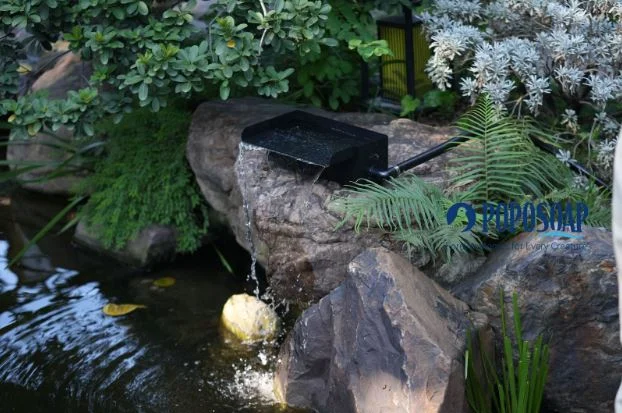A backyard waterfall is one of the most soothing, eye-catching, and rewarding water features you can add to your outdoor space.
The sound of cascading water, the beauty of rocks and flowing streams, and the wildlife it attracts all contribute to a peaceful, natural environment. The best part? You don’t need a massive budget to create a waterfall that you’ll love.
Why Choose a Waterfall for Your Backyard?
Waterfalls aren’t just visually appealing, they’re packed with benefits for you and your landscape.
1. Relaxation and Mental Health
The gentle sound of water can help reduce stress, boost your mood, and create a calming ambiance perfect for meditation or outdoor relaxation.
2. Boosts Home Value
Water features add sophistication and uniqueness to a property. A well-designed waterfall could enhance your home’s resale appeal.
3. Natural Filtration
If your waterfall is connected to a pond, the flowing water helps circulate and oxygenate the water, creating a healthier environment for fish and aquatic plants.
4. Attracts Wildlife
Birds, butterflies, frogs, and beneficial insects are drawn to your waterfall’s fresh water source.
Step 1: Planning Your Budget-Friendly Waterfall
Before diving into construction, planning goes a long way, especially when working within a budget.
Set a Realistic Budget
A small waterfall can be built for under $300, while larger or more complex features might run between $400–$1,000. Consider whether you’re adding the waterfall to an existing pond or starting from scratch.
Choose a Location
Ideal spots include:
- Near a patio or seating area where the waterfall can be enjoyed.
- A natural slope can reduce the amount of excavation needed.
- Close to a power source, unless using a solar or battery-operated pump.
Sketch Your Design
Draw a rough layout showing:
- The path of the waterfall.
- Pond or basin placement.
- Height of the cascade (1 to 3 feet is great for beginners.
- Location of the pump, tubing, and filter.
Step 2: Gather Your Materials and Tools
You don’t need to hire contractors or buy luxury landscaping materials. Many components can be found affordably or even for free.
Essential Materials:
- Pump and tubing (such as the reliable Poposoap waterfall pump kit
- Liner: A rubber pond liner or heavy-duty plastic tarp.
- Rocks and gravel: Reclaimed or purchased from a landscaping supplier.
- Basins or containers for the pond or catch basin.
- Foam sealant to direct water flow and seal gaps.
- A Poposoap Pond filter to keep the water clean and reduce algae.
Optional Additions:
- Plants (ferns, moss, water lilies)
- Lighting (solar or LED)
- Decorative features (driftwood, sculptures)
Step 3: Build the Waterfall Structure
With all your materials ready, it’s time to construct your waterfall step by step.
1. Dig the Basin
Start by digging a reservoir or pond where the water will collect. Make it deep enough to hold the pump and avoid frequent refills. For a DIY budget build, a repurposed container or kiddie pool works great.
2. Lay the Liner
Place the liner in the basin, extending it up behind where the waterfall will be built. This will catch all the returning water and keep it from leaking into the soil.
3. Stack the Waterfall
Use flat rocks, bricks, or pavers to build a tiered structure. Create a few levels for water to fall from. Each tier should slightly overlap the one below, so water flows smoothly from one step to the next.
4. Install the Pump and Tubing
Place your pump in the basin and attach the tubing, running it behind the rock structure to the top of the waterfall. The POPOSOAP water fall pump kit is especially useful here, it includes all the essential parts you need to get started, ensuring consistent and powerful water flow.
Step 4: Test the Water Flow
Before securing everything in place, test how the water flows:
- Fill the basin with water.
- Turn on the pump.
- Observe the flow and adjust the rock placements to eliminate splashing or leaks.
- Use foam sealant to fill gaps and guide water in the direction you want.
Once satisfied with the flow, secure all the components.
Step 5: Add Filtration and Finish the Look
Add a Filter
If your waterfall is part of a pond, keeping the water clean is essential. The Poposoap Pond filter is a budget-friendly, high-performance option designed to handle outdoor water systems, helping reduce algae and keeping the water safe for plants and fish.
Add Decorative Touches
- Place gravel and small rocks around the basin edges to hide the liner.
- Plant low-maintenance foliage around the structure.
- Add solar-powered LED lights for nighttime glow.
- Use moss or vines to blend the waterfall into the surrounding landscape.
Budget-Friendly Tips to Save Money
Creating a gorgeous waterfall doesn’t mean overspending. These budget hacks will help you save while still getting the look you want:
Use Recycled Materials
- Old bricks, roofing tiles, and pallets can make excellent waterfall components.
- Ask local contractors or landscapers for leftover rocks or gravel.
DIY Your Basin
Instead of buying a pre-formed pond, use a large bucket, trash can, or kiddie pool as the reservoir.
Go Solar
Skip the electricity costs with solar-powered pumps and lighting. The initial cost is higher, but it pays off quickly.
Shop Smart
- Check second hand stores and online marketplaces for pumps or liners.
- Look for off-season deals at garden centers and hardware stores.
Maintenance Tips for Long-Term Success
Even a low-cost waterfall needs basic maintenance to keep it running well year-round.
1. Regularly Check the Pump
- Remove debris from the intake screen.
- Ensure tubing is free of clogs or kinks.
- During winter, remove the pump and store it indoors if temperatures drop below freezing.
2. Keep the Water Clean
- Use a pond filter like the Poposoap Pond filter to reduce algae and odors.
- Remove leaves or plant debris weekly.
- Top off the water level periodically to account for evaporation.
3. Maintain Rock Placement
- Check rocks after heavy rainfall or frost.
- Re-secure any loose stones with expanding foam or adhesive.
Waterfall Design Ideas You’ll Love (on a Budget!)
Need some inspiration for your dream DIY waterfall? Here are a few creative and cost-effective ideas:
The Classic Cascade
Stack flat stones in a stair-step design over a sloped liner. Simple and elegant.
The Rustic Barrel Fall
Use a half wine barrel as the top water source. Water spills over into a small pond or gravel basin.
Spillway Bowl
Use wide ceramic bowls at different heights. Water flows from one to the next in a gentle, sculptural stream.
Rock Garden Waterfall
Blend your waterfall into a dry rock garden with ornamental grasses, creeping thyme, and flowering succulents.
Corner Waterfall
Perfect for small yards. Tuck it into a patio corner or against a fence to save space and add ambiance.

Final Thoughts:
Building a water feature on a budget doesn’t just save you money—it also offers the opportunity to unleash your creativity and create a stunning focal point in your backyard. With the right materials, a little time, and the smart use of affordable tools, you can transform your outdoor space into a tranquil retreat.
Whether you choose to design a classic cascade or a rustic water feature, this DIY project is one that will bring relaxation, beauty, and lasting value to your home. So gather your materials, roll up your sleeves, and enjoy the process of creating a serene outdoor element that will make your backyard the envy of all.






